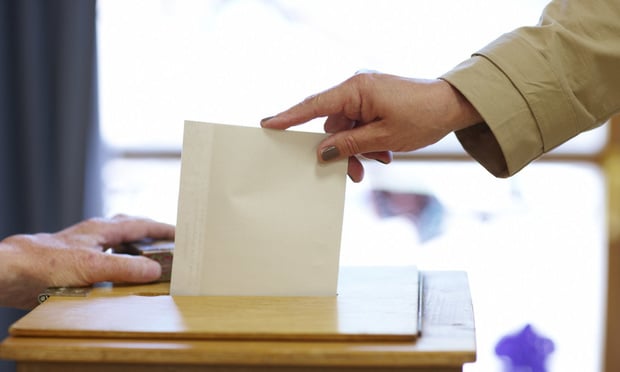Rocky Start to 2019 Philadelphia Judicial Races May Have Lasting Effects
A scramble ensued in political circles after allegations arose that a consultant working with numerous judicial candidates in Philadelphia turned in potentially fraudulent nominating petitions. While the chaos has since subsided, candidates, lawyers and politicos say its effects are likely to linger throughout the 2019 cycle, and possibly beyond.
March 28, 2019 at 04:37 PM
7 minute read
 Photo: Christian Schwier
Photo: Christian Schwier
A scramble ensued in political circles after allegations arose that a consultant working with numerous judicial candidates in Philadelphia turned in potentially fraudulent nominating petitions. While the chaos has since subsided, candidates, lawyers and politicos say its effects are likely to linger throughout the 2019 cycle, and possibly beyond.
The 2019 judicial race got off to a crowded, but familiar start on March 12 when 43 candidates seeking spots on either the Philadelphia Court of Common Pleas or the Municipal Court filed their nominating petitions with the Pennsylvania Department of State. Things, however, took a turn for the worse a few days later when bankruptcy lawyer and Common Pleas candidate Christian DiCicco began looking over the petitions of his fellow candidates.
According to DiCicco, as he looked over the petitions, he began to see the same names coming up in patterns on numerous petitions. Some pages, he said, looked nearly identical to other pages. Blocks of names appeared to be written by the same hand, and dates on a few petitions were out of order. All of it, he said, indicated “obvious forgeries.”
DiCicco said he then began finding that the same few petition circulators had handled most of the problematic petitions, and those circulators appeared to have all been hired by the same consultant who was working on several campaigns. In all, DiCicco said he found 15 problematic petitions.
“I thought I had an ethical obligation to notify the candidates that they unfortunately got caught up in this,” DiCicco said, adding he was also certain none of the candidates knew about the potentially problematic petitions.
DiCicco said that, after discovering the possible forgeries, he reached out to the Democratic City Committee to notify it of the allegedly problematic petitions, and attempted to formally challenge the petitions in court. With the help of fellow judicial candidate Joshua Roberts of Datz & Roberts, the two filed seven official challenges against six candidates, but DiCicco said they had technical difficulties in filing the challenges, and so each one got to the court after the deadline for challenges had passed, which would have established solid defenses for candidates who wanted to fight his challenges.
In the end, all of his legal challenges were withdrawn.
“I felt as though I met my duty,” DiCicco said. “I haven't gotten any blowback. I ran into a few of the candidates at a couple of fundraisers and they all understood.”
Since the challenges were all eventually withdrawn, they will have no direct impact on the 2019 judicial race, and it also appears they will have little impact on bar association ratings.
In an emailed statement, Philadelphia Bar Association chancellor Rochelle Fedullo said the bar's Judicial Commission evaluates candidates based on “professional competence, experience, judicial temperament, integrity, and commitment to the community.”
“Any unresolved challenges to nominating petitions will be for the court to determine,” she said.
However, DiCicco's decision to notify the Democratic City Committee could still have some ramifications.
According to former Congressman Bob Brady, who is the chairman of the Democratic City Committee, there is little that can happen at this point, but those with problematic ballots might get a little more scrutiny during the endorsement process.
“We'll do research on them. Some we know, some we don't know. After all the challenges are done, after all the smoke clears, then we'll do our endorsements,” Brady said. ”We're not going to condone that. We're not going to endorse a judge who has bad petitions. That's just terrible.”
Several candidates, however, said they were not worried about the endorsements or getting support from local ward leaders. Some said the challenges to their petitions greatly exaggerated the amount of potentially problematic signatures, and at least one said he did not use Rasheen Crews—the consultant at the center of the controversy—and the challenge to his petitions was simply a “misunderstanding.”
Sherman Toppin, a real estate attorney running for a Common Pleas seat, said the challenge to his petitions focused on 10 pages from the same notary. Although the challenge alleged the notary used an incorrect address, Toppin said that, since the notary had moved, the notary used the older address, which would not be a violation.
“I don't think I'm part of the bigger storyline. I don't know why I was particularly picked,” Toppin said. “I'm grateful to have resolved it with opposing counsel. We resolved it amicably with no real issues.”
Products liability attorney Nicola Serianni, who is also seeking a seat on the Common Pleas bench, also said the challenges appeared to be inaccurate.
“Once me and my team looked at everything, at the legs of the actual complaint, the numbers were off,” she said. “Even if they were right in terms of our signatures—allegedly invalid signatures in someone else's hands—even if they were right and won on all of those, we still would have been over the 1,000 threshold.”
Regarding any potential problems with endorsements, Serianni also said she doesn't think the challenge will cause any problems.
“I have a really good relationship with a bunch off ward leaders,” she said, adding that many reached out to her before she got any official word of the now-withdrawn legal challenge. “They've met me and they know me as an individual. They wanted to make sure I was OK.”
Serianni and others also said the whole incident was a shock, and that Crews had a great reputation as a dependable consultant, one who helped numerous candidates in both the 2015 and 2017 elections.
“I cannot comprehend that he would change his manner of performance to what he's being accused of,” Toppin said, noting that he had used Crews in the past without incident and, over the past few years, he had become such a popular consultant, he ended up being too busy to help on Toppin's campaign during this cycle.
“He was respected. This was a guy who did his job well,” Serianni said. “Certainly, it came as a shock to me.”
As of Wednesday, nine candidates had withdrawn from either one or both of the races in Philadelphia. Not all of them had received legal challenges, and some of those who spoke with The Legal said their decision to exit the races had solely to do with ballot placement, which is often the largest factor in determining outcome.
But, according to attorneys, one of the more significant effects of the rocky start to the 2019 judicial races may be felt for years to come. According to several attorneys, judicial races in Philadelphia were typically thought of as relatively sleepy contests, where candidates were very rarely challenged. Although observers said this notion has become increasingly less true over the past few years, the flurry of challenges earlier this month signal that candidates need to start looking at these races differently.
“I think it sent shockwaves,” Toppin said.
Candidates, attorneys said, will likely become more selective about who they hire to help circulate petitions, and they may now need to double the required 1,000 signatures to ensure they survive any potential challenge.
“The mantra was that judicial candidates don't challenge judicial candidates. These were things many candidates believed,” Toppin said. “This is something they no longer believe.”
Attempts to reach Crews at an email address and four phone numbers that appeared to be associated with him were unsuccessful. One number led to a message for Crews Consulting LLC, but the prompt said, “The person you are calling cannot accept calls at this time. We're sorry for any inconvenience this may cause.”
This content has been archived. It is available through our partners, LexisNexis® and Bloomberg Law.
To view this content, please continue to their sites.
Not a Lexis Subscriber?
Subscribe Now
Not a Bloomberg Law Subscriber?
Subscribe Now
NOT FOR REPRINT
© 2025 ALM Global, LLC, All Rights Reserved. Request academic re-use from www.copyright.com. All other uses, submit a request to [email protected]. For more information visit Asset & Logo Licensing.
You Might Like
View All

Law Firms Are 'Struggling' With Partner Pay Segmentation, as Top Rainmakers Bring In More Revenue
5 minute read

Trump RTO Mandates Won’t Disrupt Big Law Policies—But Client Expectations Might
6 minute readTrending Stories
- 1Law Firms Expand Scope of Immigration Expertise, Amid Blitz of Trump Orders
- 2Latest Boutique Combination in Florida Continues Am Law 200 Merger Activity
- 3Sarno da Costa D’Aniello Maceri LLC Announces Addition of New Office in Eatontown, NJ, and Named Partner
- 4Friday Newspaper
- 5Public Notices/Calendars
Who Got The Work
J. Brugh Lower of Gibbons has entered an appearance for industrial equipment supplier Devco Corporation in a pending trademark infringement lawsuit. The suit, accusing the defendant of selling knock-off Graco products, was filed Dec. 18 in New Jersey District Court by Rivkin Radler on behalf of Graco Inc. and Graco Minnesota. The case, assigned to U.S. District Judge Zahid N. Quraishi, is 3:24-cv-11294, Graco Inc. et al v. Devco Corporation.
Who Got The Work
Rebecca Maller-Stein and Kent A. Yalowitz of Arnold & Porter Kaye Scholer have entered their appearances for Hanaco Venture Capital and its executives, Lior Prosor and David Frankel, in a pending securities lawsuit. The action, filed on Dec. 24 in New York Southern District Court by Zell, Aron & Co. on behalf of Goldeneye Advisors, accuses the defendants of negligently and fraudulently managing the plaintiff's $1 million investment. The case, assigned to U.S. District Judge Vernon S. Broderick, is 1:24-cv-09918, Goldeneye Advisors, LLC v. Hanaco Venture Capital, Ltd. et al.
Who Got The Work
Attorneys from A&O Shearman has stepped in as defense counsel for Toronto-Dominion Bank and other defendants in a pending securities class action. The suit, filed Dec. 11 in New York Southern District Court by Bleichmar Fonti & Auld, accuses the defendants of concealing the bank's 'pervasive' deficiencies in regards to its compliance with the Bank Secrecy Act and the quality of its anti-money laundering controls. The case, assigned to U.S. District Judge Arun Subramanian, is 1:24-cv-09445, Gonzalez v. The Toronto-Dominion Bank et al.
Who Got The Work
Crown Castle International, a Pennsylvania company providing shared communications infrastructure, has turned to Luke D. Wolf of Gordon Rees Scully Mansukhani to fend off a pending breach-of-contract lawsuit. The court action, filed Nov. 25 in Michigan Eastern District Court by Hooper Hathaway PC on behalf of The Town Residences LLC, accuses Crown Castle of failing to transfer approximately $30,000 in utility payments from T-Mobile in breach of a roof-top lease and assignment agreement. The case, assigned to U.S. District Judge Susan K. Declercq, is 2:24-cv-13131, The Town Residences LLC v. T-Mobile US, Inc. et al.
Who Got The Work
Wilfred P. Coronato and Daniel M. Schwartz of McCarter & English have stepped in as defense counsel to Electrolux Home Products Inc. in a pending product liability lawsuit. The court action, filed Nov. 26 in New York Eastern District Court by Poulos Lopiccolo PC and Nagel Rice LLP on behalf of David Stern, alleges that the defendant's refrigerators’ drawers and shelving repeatedly break and fall apart within months after purchase. The case, assigned to U.S. District Judge Joan M. Azrack, is 2:24-cv-08204, Stern v. Electrolux Home Products, Inc.
Featured Firms
Law Offices of Gary Martin Hays & Associates, P.C.
(470) 294-1674
Law Offices of Mark E. Salomone
(857) 444-6468
Smith & Hassler
(713) 739-1250





